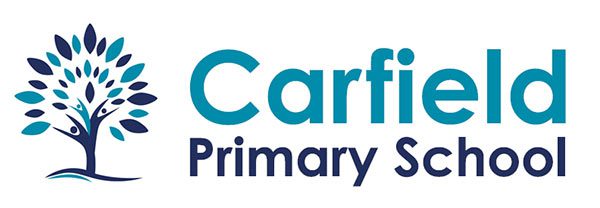Mathematics
Our Vision…
At Carfield, we aim for our pupils to be confident, resilient learners with a growth mindset, a positive view of maths and how it relates to the real world. We want them to be fluent in their number facts and active problem solvers. In order to achieve this, we ensure that we, as staff, have a positive attitude towards maths and value mistakes in their learning. Manipulatives are used to embed understanding and they are given many opportunities to reason and problem solve.

Intent
At Carfield, we aim for our pupils to be confident, resilient learners with a growth mindset, a positive view of maths and how it relates to the real world. We want them to be fluent in their number facts and active problem solvers. In order to achieve this, we ensure that we, as staff, have a positive attitude towards maths and value mistakes in their learning. Manipulatives are used to embed understanding and they are given many opportunities to reason and problem solve.
Implementation
- Power Maths (a validated scheme) is taught across school from EYFS to Y6 to ensure there is a consistent Mastery approach to teaching. Power Maths is a progression scheme in line with the National Curriculum. The Power Maths scheme has a calculation policy which outlines the progression of skills and concepts from EYFS to Y6.
- Maths is taught a minimum of 4 lessons a week with additional daily arithmetic lessons.
- Recall practise is evident and post unit assessments highlight gaps in learning. These are addressed in keep up interventions.
- Pupils are taught through clear modelling and have the opportunity to develop their knowledge and understanding of mathematical concepts using the most appropriate mathematical language/terminology.
- The mastery approach incorporates using objects, pictures, words and numbers to help pupils explore and demonstrate mathematical ideas, enrich their learning experience and deepen understanding at all levels.
- Assessment for Learning (AFL) in lessons dictates the starting point for a child: those who are already fluent in the skill and have sound understanding of a concept are able to start their learning with reasoning, and those who require full teaching input will start at the acquisition of skill.
- Pupils progress through the learning at their own pace, with regular checking from teachers and support staff to give them opportunities for talk for learning.
- Pupils are encouraged to explore, apply and evaluate their mathematical approach during investigations to develop a deeper understanding when solving different problems/puzzles.
- Pupils with additional needs are included in whole class lessons and teachers provide scaffolding or support where necessary. For those pupils who are working outside of the year group, individual learning activities are provided to ensure their progress.
Impact
- Power Maths (a validated scheme) is taught across school from EYFS to Y6 to ensure there is a consistent Mastery approach to teaching. Power Maths is a progression scheme in line with the National Curriculum. The Power Maths scheme has a calculation policy which outlines the progression of skills and concepts from EYFS to Y6.
- Maths is taught a minimum of 4 lessons a week with additional daily arithmetic lessons.
- Recall practise is evident and post unit assessments highlight gaps in learning. These are addressed in keep up interventions.
- Pupils are taught through clear modelling and have the opportunity to develop their knowledge and understanding of mathematical concepts using the most appropriate mathematical language/terminology.
- The mastery approach incorporates using objects, pictures, words and numbers to help pupils explore and demonstrate mathematical ideas, enrich their learning experience and deepen understanding at all levels.
- Assessment for Learning (AFL) in lessons dictates the starting point for a child: those who are already fluent in the skill and have sound understanding of a concept are able to start their learning with reasoning, and those who require full teaching input will start at the acquisition of skill.
- Pupils progress through the learning at their own pace, with regular checking from teachers and support staff to give them opportunities for talk for learning.
- Pupils are encouraged to explore, apply and evaluate their mathematical approach during investigations to develop a deeper understanding when solving different problems/puzzles.
- Pupils with additional needs are included in whole class lessons and teachers provide scaffolding or support where necessary. For those pupils who are working outside of the year group, individual learning activities are provided to ensure their progress.
